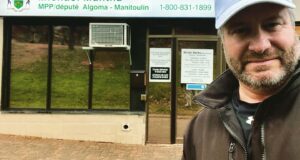The pandemic has forced all of us to make some major changes to so much of what we do in our lives and daily routines. Some of the changes are pretty small and hardly noticeable while others seem gargantuan in nature. Of late I’ve read and/or heard from small business owners expressing devotion and commitment to their business, employees and community. I’m proud to say that Northern Ontarians are resilient and resourceful. We will come out of this strong, proud and ready to grow.
I recall well an experience that I had back when I was just a lad. For some reason it has stayed with me all these years. One summer afternoon I was with my mom when she stopped at the side of a farm field where a farmer was selling fresh corn from his farm wagon. Mom was peeling back the husks on some of the cobs checking their quality when the farmer walked up with a smile as big as a barn door and said there was not need to do that because every ear was perfection. I’ll never forget the beaming pride in his eyes as he quickly joined my mom in pulling back the husks too. That farmer’s proud smile really had a lasting impact on me. That was a devoted and proud business man.
I’ve said many times that small business is the backbone of our economy – and that is a good thing. A builder knows that when you are bracing joining beams, there is so much more strength when many smaller nails spread over a larger surface than when you use just a few big spikes alone. In the same way, small business provides reliable stability when ill winds begin to blow and dark storms come to call.
The other day I was talking with a business owner who has been very successful, employing many people over the years. The fellow is a solid guy who comes across as confident and strong to his customers and employees. I asked him to share with me how things were going for his business in light of having to learn to cope with the realities of a COVID-19 economy. He started off strong as I had expected, but within minutes I could see a change coming over him as he laid it out straight and true for me so that I might understand in order to help others. Suffice to say it was hard for my friend to keep a strong upper lip. He has put his heart and soul into his business and has such pride in his ability to raise a family from his efforts. You don’t have to have a business degree to understand why today he is worried
The latest data released by Statistics Canada reveals an uneven and uncertain economic recovery where many Ontarians feel left behind. So many families are still struggling to pay the bills and get back to work. The economic crisis has wiped out many small businesses and jobs in this province, and Ontarians are afraid of what the future holds for them and their kids. Our economy is recovering too slowly, without the support we need from the Ford government, and so many Ontarians are being left behind.
Unemployment remains above 10 per cent in Ontario, double what it was before the pandemic hit, and there are over 400,000 fewer jobs than this time last year. For young people, the unemployment rate is a staggering 27.7 per cent, and employment rates are much lower among Black, Indigenous and racialized Ontarians.
Stats-Can figures show the pandemic is making our province less equal. Low-wage, gig economy workers, and many middle class families are still losing out. Many Ontarians are being forced to take on precarious part-time and gig work that will leave them even more vulnerable in this uncertain recovery.
Here in Algoma-Manitoulin many of the jobs are at minimum wage in hospitality and food services. Provincially such jobs are down by over 125,000 compared to last year, and jobs in health and social services are down 22,200.
Doug Ford continues to refuse to provide small businesses with the support they need. He recently lifted the temporary ban on commercial evictions, leaving more on the brink of shutting down forever and laying off more of their workers.
While the pandemic is having profound effects on all Ontarians, it isn’t affecting us equally. Women have lost the majority of jobs, and many women have been unable to get back into the workforce or get their businesses back on track. The she-cession has affected Black, Indigenous, racialized and disabled women most severely, as they work disproportionately on the frontlines in health care and service jobs and are at the most risk of contact with the virus.
It doesn’t have to be this way.
Weeks ago, the NDP proposed the Save Main Street plan. The Save Main Street plan is designed with small business in mind and will create good, stable, well-paying jobs for more Ontarians. Back in April, Andrea Horwath proposed a pandemic survival plan for small and medium-sized businesses, charities and community-based non-profits. It calls on the province to commit to:
- A 75 per cent commercial rent subsidy up to $10,000 a month for three months for businesses that continue to struggle with decreased revenue as a result of COVID-19
- A utility payment freeze
- A remote-work, physical-distancing and safe re-opening set up fund, to help with expenses like technology to help people work from home, and supplies and upgrades to help workplaces reopen safely for staff and the public, including plexiglass barriers, PPE, and ventilation upgrades
- An auto insurance grace period for taxis and car-sharing drivers, established in partnership with the insurance industry and the Financial Services Regulatory Authority
- A designated emergency fund for small businesses and entrepreneurs who have faced historic barriers to accessing traditional capital
With a well designed plan and strong support, we can build an inclusive economic recovery that includes everyone and recognizes the devastating impact of the pandemic on women. That means investing to ensure schools are safe so parents can return to work, direct relief for small businesses, and supporting workers in sectors that will be unable to recover for months to come.
As always, please feel free to contact my office about these issues, or any other provincial matters.
- MPP Mantha seeks update on Northern Health Travel Grant - November 27, 2024
- Fixing the housing crisis is not easy work, but it’sa job we can’t afford to put off any longer - June 17, 2024
- Résoudre la crise du logement n’est pas un travailfacile, mais c’est un travail que nous ne pouvonspas nous permettre de reporter plus longtemps - June 17, 2024
 Wawa-news.com Local and Regional News
Wawa-news.com Local and Regional News

